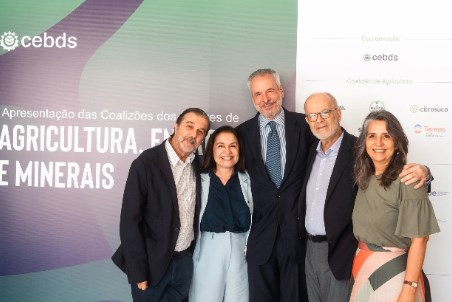Brazilian mining sector presents pathway to reduce its carbon emissions by up to 90% by 2050
Published by Jody Dodgson,
Editorial Assistant
Global Mining Review,

The Essential Minerals Coalition, an initiative that brings together 15 entities and companies from the mining sector, recently presented a report to the president of COP30, Ambassador André Corrêa do Lago, that points to potential ways to reduce its own carbon emissions by up to 90% and contribute to the reduction of Brazil's total emissions by 2050.
The document also reinforces that the Brazilian mineral sector has the potential to reduce global emissions from the steel chain and support the global electrification process. The initiative is led by the Brazilian Business Council for Sustainable Development (CEBDS), Vale, and the Brazilian Mining Institute (IBRAM).
The Coalition was formed at the invitation of the COP30 Presidency, which suggested that six key sectors of the Brazilian economy (agriculture, energy, forestry, mining, livestock, and transportation) mobilise to propose decarbonisation pathways to be presented during the event to be held in Belém in November.
The Essential Minerals Coalition report shows that the global energy transition is directly linked to mining and that Brazil is strategically positioned in this scenario, as it has one of the most diverse geologies in the world, a developed mineral sector, and a renewable electricity matrix, among other factors. In addition to pointing out the sector's potential contribution to the energy transition and the decarbonisation of the economy, the report lists five enablers for this potential to be achieved in the coming years.
"The coalitions symbolise the spirit of collective effort that COP30 inspires: companies, government, and civil society working together, collaboratively and pre-competitively, to build sectoral consensus and solutions aligned with science. The initiative is the starting point for a process that goes beyond paper: transforming consensus into implementation for a low-carbon economy. In this movement, the Minerals Coalition plays a strategic role by proposing concrete ways to decarbonise its chain and support the global energy transition," says Marina Grossi, president of CEBDS.
Vale's CEO, Gustavo Pimenta, considers the private sector's engagement essential for the climate agenda to advance in Brazil. "For Vale, which has decarbonisation as one of the central pillars of its business, it is a source of pride to co-lead this initiative. Especially at a time like this, when energy transition minerals are gaining relevance in global geopolitics. Brazil is at the centre of this discussion, as it has enormous potential for producing these minerals, in addition to being one of the largest producers of high-quality iron ore, which is essential for the decarbonisation of steelmaking," he said.
“The report shows that mining is an essential pillar of the solution to the climate crisis,” said Raul Jungmann, president of IBRAM. “Brazil has a unique competitive advantage, with geological diversity and a clean electricity matrix. The report shows that we are ready to supply the minerals the world needs to build a low-carbon economy, but we cannot do it alone.”
Levers for reducing emissions
The Coalition analysed three areas in which mining can contribute to decarbonisation and the global energy transition. The first, focused on reducing emissions from mining itself, pointed to a potential reduction of up to 80% in emissions from the sector and the neutralisation of around 14% of emissions, leading to a total reduction of around 90% by 2050. Five levers were identified to achieve this scenario: energy efficiency; use of biofuels; expansion of the use of electricity from renewable sources; electrification of fleets and equipment; and recovery of degraded areas to neutralise residual emissions.
A second axis, dedicated to mining contributions to reducing emissions from the global iron ore chain, indicated that reductions could reach 110 MtCO2e in 2050 (equivalent to eight times the annual emissions from Brazilian mining in 2022) through the production of inputs for low-carbon steel, such as pellets and briquettes for direct reduction routes. In addition, there is the possibility of reducing emissions in activities such as pelletising, rail transport, and international shipping, depending on economic instruments and enablers presented in the report.
In relation to energy transition minerals – such as copper, nickel, bauxite, lithium, rare earths, among others – the Coalition estimates that the Brazilian mineral sector could double production of these minerals by 2050, leading to a reduction in the country's total emissions of up to 300 MtCO2e per year in 2050, equivalent to the total emissions of the states of São Paulo and Minas Gerais in 2023 altogether.
This scenario takes into account the increase in global electric vehicle production to an additional 38 million by 2050, and the expansion of installed wind power generation capacity by up to an additional 830GW and solar power by up to an additional 610GW worldwide by 2050, in addition to the expansion of electricity grids and energy storage systems.
The report also points out that the potential contribution of Brazilian mining depends on the creation of a favourable environment, based on five enablers: improvements in the regulatory and economic scenario, with the entry into force of carbon pricing; greater access to technically mature and economically viable technologies; logistics, energy, and storage networks with sufficient capillarity and capacity; consolidated “green” financial instruments and sustainable taxonomies; and a “green premium,” an additional payment for products with a lower carbon footprint, in addition to incentives throughout the value chain to promote practices such as circularity.
Read the article online at: https://www.globalminingreview.com/mining/15102025/brazilian-mining-sector-presents-pathway-to-reduce-its-carbon-emissions-by-up-to-90-by-2050/
You might also like
PEA report confirms world leading alumina resource in Saskatchewan
Canadian Energy Metals Corp. (CEM) has announced the results of its Preliminary Economic Assessment (PEA), which outlines the scale, quality, and potential economic viability of Canada's first major domestic alumina resource.

